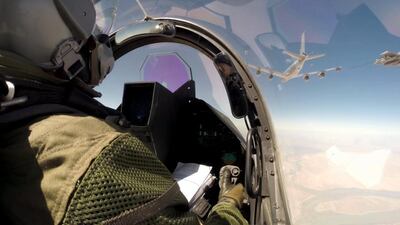PARIS // French fighter jets struck against ISIL in Iraq on Friday, destroying a logistics depot and killing dozens of militants, Iraqi and French officials said.
The attack made France the first foreign country to publicly add military muscle to United States airstrikes against the extremist group. Two Rafale fighter jets accompanied by support planes struck in northern Iraq on Friday morning, and the target was “entirely destroyed”, the French president Francois Hollande said.
A French military official said four laser-guided bombs struck a Iraqi military installation that had been overrun by the militants, and hit a munitions and fuel depot.
The Iraqi military said dozens of extremist fighters were killed in four strikes, though the French official said the damage assessment had not been completed.
“Other operations will follow in the coming days with the same goal – to weaken this terrorist organization and come to the aid of the Iraqi authorities,” Mr Hollande said.
Qassim Al Moussawi, an Iraqi military spokesman, said the French planes hit near the town of Zumar, in an area that remains heavily contested by ISIL fighters, even though Iraqi and Kurdish security forces have managed to make headway nearby with the support of US airstrikes.
Mr Hollande, who said the airstrikes were requested by Iraq’s government, ruled out French troops on the ground.
The first French airstrikes in Iraq have added significance: France, one of America’s oldest allies, was among the most vocal critics of the decision of the then US president George W Bush to conduct military action in 2003 that toppled Saddam Hussein.
The US president Barack Obama has called for a global coalition to defeat ISIL, which has drawn criticism around the world and in a unanimous UN Security Council resolution for its barbarity.
Along with reports of mass executions of rival fighters and civilians, footage of the beheading of two US journalists and a British aid worker in Syria sparked international outrage and spurred calls for tougher action against the group.
Mr Obama has pledged to support Kurdish and Iraqi federal forces by offering air support and arms, as well as targeting intelligence and training.
On Thursday, Congress backed his plan to arm Syrian rebels to take on ISIL in conjunction with airstrikes inside Syria, where it controls large areas.
“These terrorists thought they could frighten us, or intimidate us, or cause us to shrink from the world,” Mr Obama said, after a rare moment of bipartisanship in the House.
“But today they’re learning the same hard lesson of petty tyrants and terrorists who have gone before.”
France’s military action appeared to win qualified endorsement from Iraq’s top Shiite leader, Grand Ayatollah Ali Al Sistani.
In a Friday sermon, delivered by one of his aides, the elderly cleric acknowledged Iraq needed foreign help but said the country must not become subservient to outside powers.
“Even if Iraq is in need of help from its brothers and friends in fighting black terrorism, maintaining the sovereignty and independence of its decisions is of the highest importance,” the ayatollah’s spokesman said.
ISIL fighters, who have controlled much of Syria’s eastern oil and agricultural provinces for more than a year, swept through mainly Sunni Muslim regions of north Iraq in mid-June, seizing cities including Mosul and Tikrit and halting only a few dozen kilometres north of the capital Baghdad.
The US launched airstrikes against the group on April 8 to prevent “genocide” of minority communities in northern Iraq and protect its interests in Erbil, the capital of the autonomous Iraqi Kurdish region.
Since then, the US has conducted 176 airstrikes in Iraq, its military central command said on Thursday. On Wednesday, it hit a militant training camp south-east of Mosul and an ammunition stockpile south-east of Baghdad. It has also conducted a number of strikes this week in Iraq’s Anbar province, near the strategic Haditha Dam.
Mr Hollande has tressed that France will not go beyond airstrikes in support of the Iraqi military or Kurdish peshmerga forces, and will not attack targets in Syria.
France is conducting operations in Iraq from French Air Base 104 inside the vast Al Dhafra base near Abu Dhabi. French jets began flying reconnaissance missions over Iraq on Monday.
The base, home to about 700 French service personnel and six Rafales, is 1,700km from Mosul, meaning that the planes need midair refuelling to strike in Iraq.
France could also mobilise its only aircraft carrier, the Charles de Gaulle, which is now docked in southeastern France and would need at least five days to reach the eastern Mediterranean. The ship can carry about 30 planes including Rafales, Super-Etendards and U.S-built E-2C Hawkeye surveillance aircraft.
* Associated Press, Agence France-Presse and Reuters

